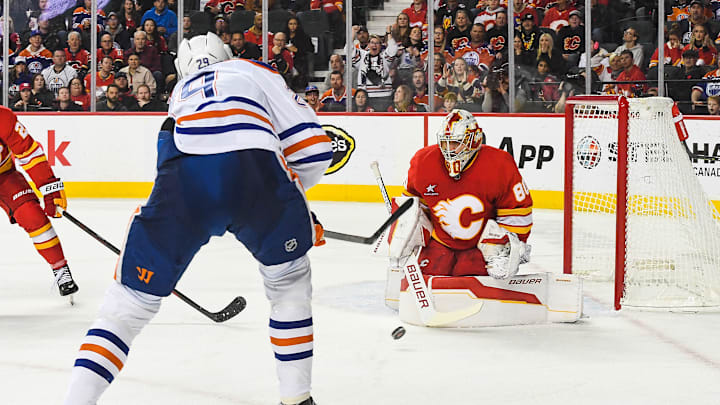The Edmonton Oilers have long been known for their dynamic, offense-first approach, with superstar talent that can typically overwhelm opponents. Their style is not built on defensive lockdowns but on speed, creativity, and a relentless offensive push led by Connor McDavid and Leon Draisaitl. Yet 14 games into the season, Edmonton’s scoring totals tell a disappointing story, just 33 goals, putting them among the lowest-scoring teams in the league, an outcome few anticipated.
The Oilers are currently 4th lowest in total goals scored across the league, only ahead of the Islanders, Predators, and Ducks. However, Edmonton has played more games than each of these teams, making their goal-scoring issues even more pronounced when normalized by games played. For a team historically able to match or exceed the scoring output of top contenders, this lack of offense has quickly become the Oilers’ primary stumbling block.
Blame the Offense, Not Just the Defense or Goaltending
Yes, there have been defensive lapses and inconsistencies in net, but the Oilers’ goals-against figure is not among the league's worst. It actually sits closer to the middle, indicating that while the defense and goaltending aren’t flawless, they’re not the core problem.
The root issue is Edmonton’s inability to score consistently, averaging under three goals per game. Scoring this few goals doesn’t allow a team to compete in today’s NHL, especially for a team built to win games with its offense. Many fans expected the Oilers to be battling for scoring supremacy with the other top-tier teams, not lagging among teams expected to finish near the bottom of the standings.
A Struggling Power Play Adding to the Problem
Adding to Edmonton’s offensive struggles is the uncharacteristic underperformance of their power play. Typically a strength, Edmonton’s power-play unit is near the bottom of the league, a major contributor to their overall lack of scoring. Historically, the Oilers have boasted one of the most lethal power plays in the NHL, and this aspect of their game has been a reliable source of momentum and goal production. This season, however, their power-play troubles have left them unable to capitalize on man-advantage opportunities, amplifying their struggles to generate offense.
A Season-Long Trend, Not Just McDavid’s Absence
Connor McDavid missed three games this season, yet in his absence, the Oilers managed to score five goals in one game and four in another, though they were shut out in the third. This suggests that the offensive struggles cannot be entirely pinned on McDavid’s absence, even with him on the ice, Edmonton has failed to meet scoring expectations. When McDavid and Draisaitl aren’t producing at their usual levels, the Oilers’ secondary scorers become crucial, but so far, the depth contributions have been limited. Without reliable secondary scoring, the Oilers have been forced into close, low-scoring games, which is simply unsustainable for a team designed to outscore opponents.
Urgent Need for Offensive Adjustments
The Oilers need to rediscover their scoring touch and fast. Changes to the power play, line combinations, and perhaps even strategic tweaks could be necessary to jump-start this team’s offense. A defensively structured team might be able to survive low-scoring games, but for a team built around offensive firepower, scraping by on minimal goal production is a losing proposition.
The Oilers have the skill, but they need execution to match. Without a surge in offensive productivity, particularly on the power play, the Oilers may find themselves fighting uphill in a season where they should be competing with the best.
